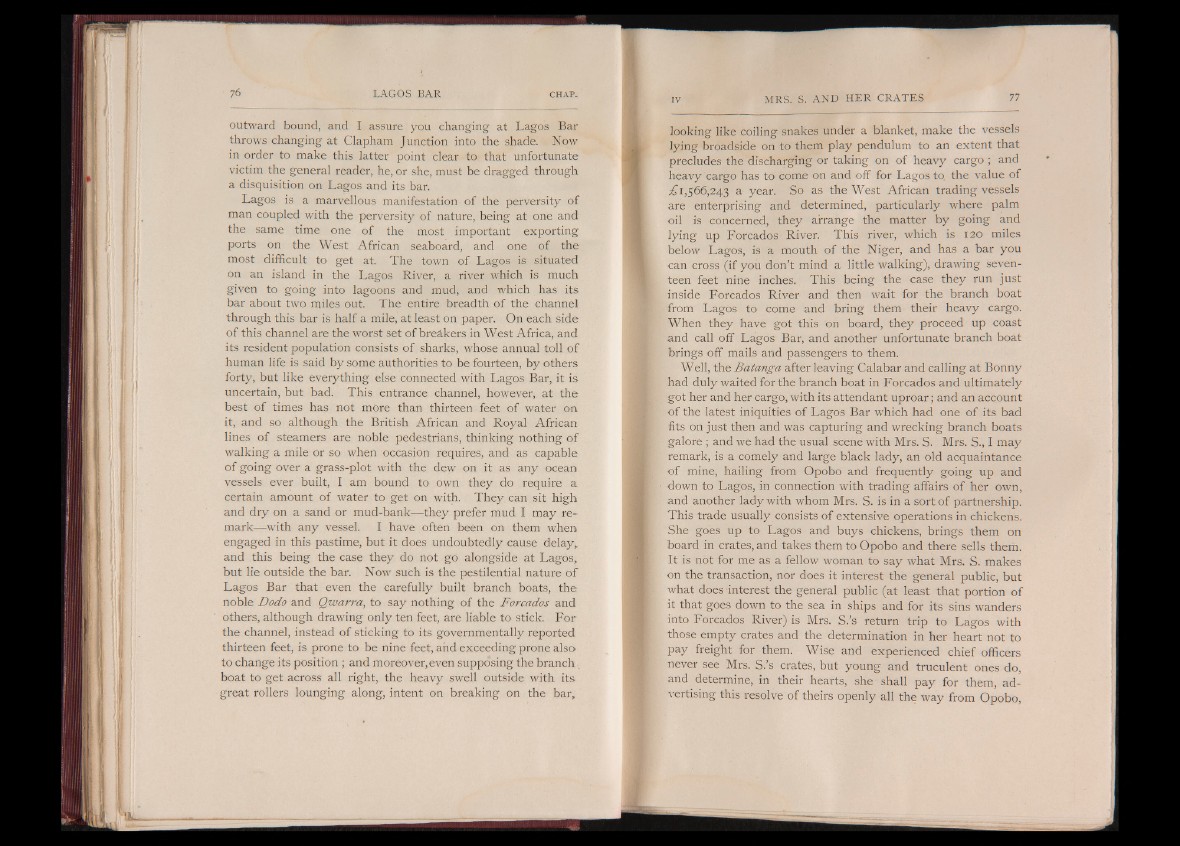
outward bound, and I assure you changing at Lagos Bar
throws changing at Clapham Junction into the shade. Now
in order to make this latter point clear to that unfortunate
victim the general reader, he, or she, must be dragged through
a disquisition on Lagos and its bar.
Lagos is a marvellous manifestation of the perversity of
man coupled with the perversity of nature, being at one and
the same time one of the most important exporting
ports on the West African seaboard, and one of the
most difficult to get at. The town of Lagos is situated
on an island in the Lagos River, a river which is much
given to going into lagoons and mud, and which has its
bar about two miles out. The entire breadth of the channel
through this bar is half a mile, at least on paper. On each side
of this channel are the worst set of breakers in West Africa, and
its resident population consists of sharks, whose annual toll of
human life is said by some authorities to be fourteen, by others
forty, but like everything else connected with Lagos Bar, it is
uncertain, but bad. This entrance channel, however, at the
best of times has not more than thirteen feet of water on
it, and so although the British African and Royal African
lines of steamers are noble pedestrians, thinking nothing o f
walking a mile or so when occasion requires, and as capable
of going over a grass-plot with the dew on it as any ocean
vessels ever built, I am bound to own they do require a
certain amount of water to get on with. They can sit high
and dry on a sand or mud-bank— they prefer mud I may remark—
with any vessel. I have often been on them when
engaged in this pastime, but it does undoubtedly cause delay,
and this being the case they do not go alongside at Lagos,
but lie outside the bar. Now such is the pestilential nature o f
Lagos Bar that even the carefully built branch boats, the
noble Dodo and Qwarra, to say nothing of the Forcados and
others, although drawing only ten feet, are liable to stick. For
the channel, instead of sticking to its governmentally reported
thirteen feet, is prone to be nine feet, and exceeding prone also
to change its position ; and moreover, even supposing the branch
boat to get across all right, the heavy swell outside with its
great rollers lounging along, intent on breaking on the bar,
looking like coiling snakes under a blanket, make the vessels
lying broadside on to them play pendulum to an extent that
precludes the discharging or taking on of heavy cargo ; and
heavy cargo has to come on and off for Lagos to. the value of
.£1,566,243 a year. So as the West African trading vessels
are enterprising and determined, particularly where palm
oil is concerned, they arrange the matter by going and
lying up Forcados River. This river, which is 120 miles
below Lagos, is a mouth of the Niger, and has a bar you
can cross (if you don’t mind a little walking), drawing seventeen
feet nine inches. This being the case they run just
inside Forcados River and then wait for the branch boat
from Lagos to come and bring them their heavy cargo.
When they have got this on board, they proceed up coast
and call off Lagos Bar, and another unfortunate branch boat
brings off mails and passengers to them.
Well, the Batanga after leaving Calabar and calling at Bonny
had duly waited for the branch boat in Forcados and ultimately
got her and her cargo, with its attendant uproar 5 and an account
o f the latest iniquities of Lagos Bar which had one of its bad
fits on just then and was capturing and wrecking branch boats
galore ; and we had the usual scene with Mrs. S. Mrs. S., I may
remark, is a comely and large black lady, an old acquaintance
of mine, hailing from Opobo and frequently going up and
down to Lagos, in connection with trading affairs of her own,
and another lady with whom Mrs. S. is in a sort of partnership.
This trade usually consists of extensive operations in chickens.
She goes up to Lagos and buys chickens, brings them on
board in crates, and takes them to Opobo and there sells them.
It is not for me as a fellow woman to say what Mrs. S. makes
on the transaction, nor does it interest the general public, but
what does interest the general public (at least that portion of
it that goes down to the sea in ships and for its sins wanders
into Forcados River) is Mrs. S.’s return trip to Lagos with
those empty crates and the determination in her heart not to
pay freight for them. Wise and experienced chief officers
never see Mrs. S.’s crates, but young and truculent ones do,
and determine, in their hearts, she shall pay for them, advertising
this resolve of theirs openly all the way from Opobo,